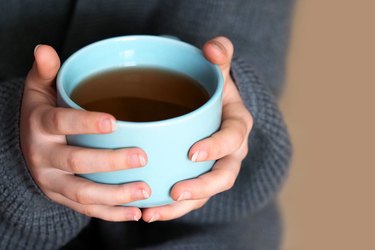
When faced with high blood pressure, you might consider making the switch from regular to decaffeinated coffee as a way to improve your numbers. But since decaf coffee and some low-caffeine teas, like green tea, still have some caffeine in them, would it make a difference?
Video of the Day
Video of the Day
The Lowdown on Caffeine
It's clear that caffeine can cause a short, but dramatic, increase in blood pressure, according to the Mayo Clinic. That's true whether you already have high blood pressure or not.
The reason why it happens isn't fully understood, but there are two strong theories about the mechanism at play, Mayo Clinic says. One is that caffeine may block a certain hormone that keeps arteries widened, which means your arteries narrow slightly and temporarily, leading to more pressure as your blood tries to flows through. The other is that caffeine causes your adrenal glands to release adrenaline — also called epinephrine, Mayo Clinic reports.
Epinephrine is a hormone that is part of your stress response, according to the Endocrine Society. When that gets released, you experience all the signs of fight-or-flight mode, such as sweaty palms, nervous stomach and higher blood pressure as your heart rate accelerates.
This effect may continue for a few hours right after caffeine consumption, according to dietitian Sarah Marjoram, RDN, LD, an Atlanta-based dietitian/nutritionist and founder of Nourish. However, she offers a bit of good news for regular caffeine drinkers, noting that the effect of caffeine is diminished if you have about the same amount each day because, for many people, the body adjusts.
Switching to Decaf
While caffeine is fine for those with blood pressure in the normal range, what if you have high blood pressure apart from your daily coffee fix? That's when it might be good to limit the amount you drink to 200 milligrams a day, Mayo Clinic advises. That's about how much you would get with two eight-ounce cups of brewed coffee.
Keep in mind, though, that coffee is far from the only source of caffeine, and if you consume multiple types of caffeinated beverages and foods during the day, you may be getting more caffeine than you realize. According to the Center for Science in the Public Interest (CSPI), the amount of caffeine in food and drink varies widely among energy drinks, soft drinks, caffeinated waters, snack foods, chocolates and ice creams.
Decaf coffee does not have zero caffeine, CSPI says, but it does have significantly less, ranging from 2 1/2 to 25 milligrams per 16-ounce cup in store-bought versions and coffee-shop options. (You could be looking at up to 360 milligrams per 16-ounce cup in some caffeinated counterparts.) And, if you're not a fan of decaf coffee, you can often get a more modest amount of caffeine in options like green tea or iced black tea.
CSPI states that caffeine is not wholly good or bad on its own, but if you consume high amounts of it, you can have issues beyond blood pressure, particularly when you try to cut down. This can include withdrawal symptoms like headaches, irritability and fatigue.
Determine Your Effect
It's helpful to pay attention to how much caffeine is actually affecting you if you have high blood pressure, notes the Mayo Clinic. For example, check your blood pressure right before drinking a cup of brewed coffee, and then check twice more — once 30 minutes after, and again two hours after.
If your blood pressure increases by 5 to 10 points on those second and third readings, May suggests that you consider cutting back or even eliminating caffeinated beverages altogether. Marjoram suggests herbal tea as an alternative in the morning if you're looking for the same experience of a hot drink first thing, but without the caffeine.
As with any condition, be sure to talk to your doctor if you have concerns. High blood pressure can raise your risk for several health problems, according to the American Heart Association, including stroke, heart failure, heart attack and vision loss. Taking steps to manage your blood pressure — which may include switching to decaf — could prove an important part of your blood pressure management plan.
Read more: 6 Teas to Stock Up On and Their Health Benefits
- Mayo Clinic: "Caffeine: How Does It Affect Blood Pressure?"
- Endocrine Society: "What Is Adrenaline?"
- Sarah Marjoram, RDN, LD, dietitian/nutritionist, founder of Nourish, Atlanta
- Center for Science in the Public Interest: "Caffeine Chart"
- American Heart Association: "Health Threats From High Blood Pressure"